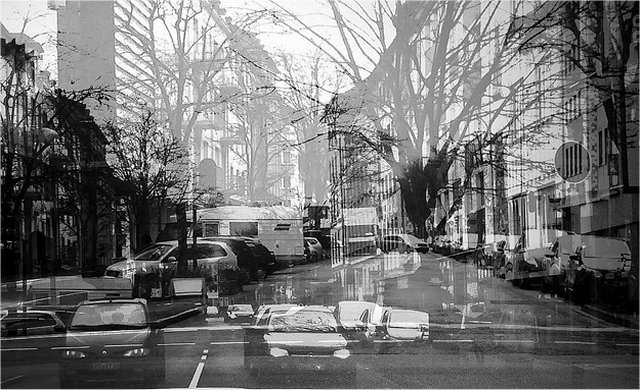Cola Hard Cash
Of course Stephanie had heard the rumors, the stories. Everyone had. Emails about it would make the rounds from time to time. They’d probably even joked about it in the collective. But she’d written it off as some kind of urban legend, wishful thinking. It was so improbable. And yet, here she was sitting in the driver’s seat of her old worn out Honda with a gun in her face and a courier bag full of plastic soda bottle caps in her lap.
In the year or so before the Bifurcation, when things were going seriously downhill but before the collapse, one of the soda companies had started a game they called “Cola Hard Cash.” It was the sort of thing most people over thirty wouldn’t see in the blur of advertising on every bottle and can. Stephanie herself didn’t actually remember seeing the plastic bottles or caps for this specific game, but knew about it from the stories she had heard in recent years, stories she had never believed until now.
Sure, she believed the Cola Hard Cash game was probably true. Just another gimmick to get people to buy a product that was nearly indistinguishable from its competitors, a trick all the other soda companies had tried at one time or another. On the inside of each bottle cap was printed a dollar amount, ranging from $1 to $1,000,000. Of course, there were a lot of one dollar caps floating around and only one worth a million. The caps were to be collected by consumers and exchanged for items of varying value. T-shirts and duffel bags with the company logo. Small audio electronics. A car, which was to be awarded to the first person to amass ten million bottle cap dollars’ worth of Cola Hard Cash. As deflation started dragging the economy down in an unstoppable spiral, the soda company added more practical prizes, durable goods like washing machines and refrigerators, in an effort to attract and keep increasingly desperate customers in the game.
After the Bifurcation, the underground markets exploded. According to the myth, which Stephanie now realized must not be a myth after all, the Cola Hard Cash bottle caps had developed a value of their own. Those little backyard shops and carts that popped up in every neighborhood, they would accept the bottle caps like they were cash. Stephanie had heard there were parts of town where you could do all your business, meet all your needs, without any real currency. All you needed was Cola Hard Cash.
“Seeeeevan,” Irène whimpered. “Sell her the silicon paint and you’ll have her by the balls. She can’t turn me in for being here, because you’ll turn her in for buying it.”
Sevan reached around to the back of Irène’s head and grabbed her by the hair. Stephanie could almost feel the pain in her own scalp, although she was grateful to see the gun drift away. Sevan held on tight while he seemed to consider what his girlfriend had just said. Irène’s eyes went blank as she stared back at him. As if a light had gone out. She was barely sixteen, Stephanie thought, too young for this.
“How much you got in there?” Sevan asked Marcus.
“You said four-fifty for cash? I’ll give you five hundred in colas.”
Stephanie opened her mouth, but she didn’t speak. Surely Marcus wasn’t so stupid that he was raising the price.
“Make it five-fifty.”
“No way,” Marcus said quickly. Too quickly, Stephanie thought. “Five-ten, tops.”
Sevan seemed to think for a moment. “She a good lawyer?” he asked Irène.
“Le meilleur,” Irène said. “The best.”
Sevan looked at Stephanie. “Sometimes my business associates need legal representation. From time to time.” He was still holding Irène tightly by her hair.
Stephanie suddenly realized that Sevan had switched to English. He’d wanted her to understand every word. Stephanie was part of the price.
She said, “I only represent juveniles. Younger than eighteen.”
“Exactly,” Sevan said. “What can you do for my boys?”
His boys? He couldn’t even be as old as Marcus. “I’m a public defender. Cases get assigned randomly.”
“Irène says you’re good.” He loosened his grip on the back of her head and began petting Irène’s hair gently. But he was watching Stephanie. “I’m sure you can take care of it.”
Stephanie knew that blank look in Irène’s eyes. Most of the kids she represented had one just like it. What she realized now was what it meant. Sure, it meant fuck you and you’ll never understand me as she’d always known. But now she knew it also meant I’m afraid.
She took a deep breath. “Fine, Sevan. Send them my way. Just make sure they get their stories straight before I see them.”
Sevan put his arm around Irène’s waist and shoved the gun into the waistband of his khakis. He spoke in Smark to the linebacker, who headed for the garage.
Marcus handed Stephanie a paper sack. “Hold this open.” He began counting out colas. When he was done he took the sack and folded the top down neatly like a mother just finishing her child’s lunch.
The linebacker reappeared with a one gallon paint can in his hands. It looked tiny against his bulk. He handed it to Sevan. Marcus handed the sack of colas to Stephanie. As if they’d rehearsed it, Stephanie and Sevan slowly reached their goods toward each other through the open window. When Stephanie had a firm grip on the handle of the paint can and the colas were sitting in Sevan’s palm, each of them let go of the other’s buy.
“Now get out of here,” Sevan said.
“Yeah,” said Irène. “Fous le camp.” She flicked her fingers at them in a dismissive gesture.
Stephanie reached to turn the key, but Sevan interrupted her.
“Hang on,” he said. “If something happens to my Irène, I won’t waste my time with the cops. My first call will be to the electric company.”
Stephanie turned to Marcus, who shook his head almost imperceptibly.
“He didn’t have to tell me,” Sevan said. “There’s only one thing people like you would be buying silicon paint for.”
“Start the car, Steph,” Marcus said softly.
Stephanie’s hands shook as she turned the key in the ignition. She put the car in drive and began to pull away very slowly, then heard Irène call out, “Stephanieeeee!” She stumbled out of Sevan’s grasp toward the car. Stephanie braked lightly as Irène staggered against the door. “See you at my next hearing!”
“Okay. You be safe.”
Then Irène whispered, all-American, “You better change your license plates. Just to be sure.” She laughed her tinkling little French laugh and pushed herself away from the car, waving. “Au revoir!”
⊕
The Downey Church of Religious Science and Wedding Chapel was deserted when Stephanie and Marcus passed it on their way back. Neither of them spoke for a long time. They got caught in a line of traffic behind a train in Montebello. Marcus opened the passenger door and began sweeping out chunks of glass with a notebook he took from his messenger bag. Stephanie put on the parking brake and reached into the glove box, taking out an oversized wallet.
“How much does the Fuel Cell owe you? For the colas.”
“It works out to three hundred and eighty two dollars and fifty cents.”
She said, “That can’t be right. It’s less than what he was asking for in cash.”
“Colas have been moving up against the dollar lately,” Marcus said.
How did he know this? Stephanie said, “I never believed those stories about colas.”
Marcus slammed the door shut. “You own property. You didn’t need to.”
Stephanie felt a prick of anger. He just couldn’t help himself, could he? But the truth was, he was right.
“Anyway,” Marcus said quickly, “after what Irène said about having you by the balls, I knew we could get a better price. She did you a favor.”
“That’s what scares me.”
“She’ll be all right,” Marcus said. “She held her own with Sevan, and she has a good lawyer looking out for her.”
For a moment, Stephanie couldn’t speak. She moved the stick shift into neutral and took her foot off the clutch. She finally said, “I can’t believe you could do the math in your head. With a gun pointed at it.”
Marcus looked down and dusted invisible glass pebbles off his lap.
The end of the train was in sight. Stephanie pushed in the clutch and released the parking brake. “Here,” she said, handing Marcus the wallet. “Count out what we owe you.”
“There won’t be enough. It’s more than we collected at the last meeting.”
Stephanie said, “I’ll cover it.”
“But your window. I should take care of that. I’ll subtract it from the three-eighty. How much do you think it’ll be?”
Stephanie shook her head. “Don’t worry about it. What matters is we have the paint. We can get back to building our solar panels and taking this godforsaken city off the grid.”
Marcus started counting out bills. “I can hook you up with a guy in Lancaster who does auto glass for good prices. He does license plates too. Unofficially.”
Stephanie had always known Marcus lived in a world different from hers, but she’d never considered how much it might be like Irène’s. Or how little it would take for her own world to become like both of theirs.
What would it feel like to drive around with illegal plates? Always anxious for the day a bored cop on patrol would look them up and discover they didn’t match the car’s registration. Would it be worse than waiting for the day Sevan called the electric company and they tracked her down by her by her current plate number?
She said, “Okay. Put me in touch with your auto parts guy.”
Marcus didn’t smirk, and he didn’t recite lines from his book of quotations. He didn’t say or do anything to indicate he realized how the balance of power between them had shifted. He simply said, “You got it.”
Bronwyn Mauldin is the author of the novel Love Songs of the Revolution, and the short story collection The Streetwise Cycle. She is a past winner of The Coffin Factory (now Tweed’s) magazine’s very short story contest. Her work has appeared in the Akashic Books “Mondays Are Murder” series, and in Literature for Life, Necessary Fiction, CellStories, Clamor magazine, Medium, and other places. She is the creator of GuerrillaReads, the online video literary magazine. In September 2016 she was Artist in Residence at Mesa Verde National Park. More at bronwynmauldin.com.
Featured image via Su5e




